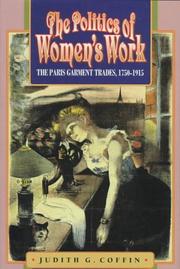| Listing 1 - 3 of 3 |
Sort by
|
Book
ISBN: 9221278034 Year: 2014 Publisher: Basingstoke : Palgrave Macmillan,
Abstract | Keywords | Export | Availability | Bookmark
 Loading...
Loading...Choose an application
- Reference Manager
- EndNote
- RefWorks (Direct export to RefWorks)
This new volume analyses how workers, governments and business can collaborate in order to confront the key opportunities and challenges affecting labour in apparel global value chains. It provides new empirical insights into the garment sector in Asia (Cambodia, India, Lao People's Democratic Republic), Europe (Romania), Africa (Lesotho, Morocco) and the Americas (Haiti, Nicaragua), with a focus on wages, worker empowerment and the institutional contexts facilitating or hampering the attainment of improved working conditions.
Clothing workers --- Manufacturing industries --- Supply and demand. --- Employees
Book
Year: 2014 Publisher: Washington : U.S. Government Printing Office,
Abstract | Keywords | Export | Availability | Bookmark
 Loading...
Loading...Choose an application
- Reference Manager
- EndNote
- RefWorks (Direct export to RefWorks)
Labor laws and legislation --- Employee rights --- Clothing factories --- Clothing workers --- Industrial accidents --- Safety measures. --- Health and hygiene --- United States --- Bangladesh --- Foreign economic relations

ISBN: 0691034478 1306984297 9781400864324 1400864321 9781306984294 Year: 2014 Publisher: Princeton, NJ
Abstract | Keywords | Export | Availability | Bookmark
 Loading...
Loading...Choose an application
- Reference Manager
- EndNote
- RefWorks (Direct export to RefWorks)
Few issues attracted more attention in the nineteenth century than the "problem" of women's work, and few industries posed that problem more urgently than the booming garment industry in Paris. The seamstress represented the quintessential "working girl," and the sewing machine the icon of "modern" femininity. The intense speculation and worry that swirled around both helped define many issues of gender and labor that concern us today. Here Judith Coffin presents a fascinating history of the Parisian garment industry, from the unraveling of the guilds in the late 1700s to the first minimum-wage bill in 1915. She explores how issues related to working women took shape and how gender became fundamental to the modern social division of labor and our understanding of it.Combining the social history of women's labor and the intellectual history of nineteenth-century social science and political economy, Coffin sets many questions in their fullest cultural context: What constituted "women's" work? Did women belong in the industrial labor force? Why was women's work equated with low pay? Should not a woman enjoy status as an enlightened homemaker/consumer? The author examines patterns of consumption as well as production, setting out, for example, the links among the newly invented sewing machine, changes in the labor force, and the development of advertising, with its shifting and often unsettling visual representations of women, labor, and machinery. Throughout, Coffin challenges the conventional categories of work, home, and women's identity.Originally published in 1996.The Princeton Legacy Library uses the latest print-on-demand technology to again make available previously out-of-print books from the distinguished backlist of Princeton University Press. These editions preserve the original texts of these important books while presenting them in durable paperback and hardcover editions. The goal of the Princeton Legacy Library is to vastly increase access to the rich scholarly heritage found in the thousands of books published by Princeton University Press since its founding in 1905.
Clothing trade --- Needlework industry and trade --- Women clothing workers --- Women --- Human females --- Wimmin --- Woman --- Womon --- Womyn --- Females --- Human beings --- Femininity --- Clothing workers --- Women textile workers --- Textile industry --- Apparel industry --- Clothiers --- Clothing industry --- Garment industry --- Rag trade --- Tailors --- History --- Employment&delete& --- Fashion industry --- Labour market --- Manufacturing technologies --- History of France --- anno 1800-1999 --- History. --- Employment --- France --- Paris (France) --- Women clothing workers - France - Paris - History. --- Women - Employment - France - Paris - History. --- Clothing trade - France - Paris - History. --- Needlework industry and trade - France - Paris - History. --- Vêtements --- Travaux à l'aiguille --- Femmes --- Vêtement, Travailleuses du --- Industrie et commerce --- Histoire --- Industrie --- Travail --- Business & Economics --- Labor & Workers' Economics --- FEMMES --- TRAVAIL ET TRAVAILLEURS --- VETEMENTS --- PARIS (FRANCE) --- TRAVAIL --- 18E-20E SIECLES --- FRANCE --- CONDITIONS SOCIALES --- INDUSTRIE ET COMMERCE --- CONDITIONS ECONOMIQUES --- 19E-20E SIECLES
| Listing 1 - 3 of 3 |
Sort by
|

 Search
Search Feedback
Feedback About UniCat
About UniCat  Help
Help News
News